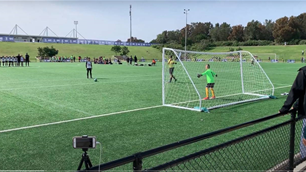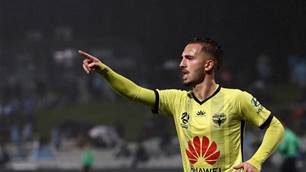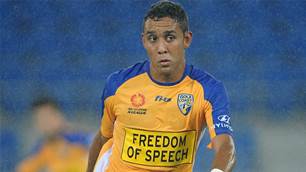MELBOURNE Heart's new youth league coach is a former international with a decade of European coaching experience to draw on – and he's an Aussie.
Joe Palatsides is one of a handful Australian coaches to have forged a career abroad, having made the transition from player to manager in Greece and finding some success in the second and third divisions there.
The 47-year-old brings much-needed experience, as well as a rare international perspective, to Heart's coaching staff, where he joins young assistant Hayden Foxe in supporting rookie boss John Aloisi.
While emphasising that he is fully behind Aloisi and the Heart project, Palatsides explained his move home and said he remains ambitious to pursue his coaching to the highest level possible.
“I think people don't realise Greece is a very good standard,” Palatsides told au.fourfourtwo.com. “After winning the Euros (in 2004) Greece have really upped their standard playing-wise.
“It's a national pastime there. You have 20 sports papers writing daily about your club. It's a way of life. That's all I think about and all I wake for as a coach. You wake up and think about how you're going to win on the weekend.
“Last year I could see that financially Greece was in a bad way, and I didn't think it was the right place for my family. So I made the decision to head back and I'm very appreciative of the opportunity Melbourne Heart have given me. I think they did what nobody else did and looked a bit deeper into what I could offer.
“It's a very exciting time at the club. They've come off a year where they made the finals. John Aloisi is a very knowledgeable coach. He's very set in the way he wants to go about things and he's working towards that in the right manner.”
Palatsides has been largely off the radar in the A-League era but he will be remembered as a player by NSL fans, perhaps in the most part for scoring a late equaliser for South Melbourne in their dramatic Grand Final win in 1991 under coach Ferenc Puskas and captain Ange Postecoglou.
The one-time Socceroo later tried his hand in Greece where he was a part of the PAOK squad that knocked Arsenal's domestic double-winning side of 1997-98 out of Europe, Dennis Bergkamp, Patrick Vieira and all.
PAOK were then eliminated by Atletico Madrid featuring Christian Vieri and, just to add to the Aussie connections, future Sydney FC marquee Juninho.
He would eventually move from the pitch to the dugout at Poseidon Neas Michanionias before recently overseeing successful promotion campaigns at Zakynthos and his first Greek club as a player, Apollon Kalamarias.
All the while, Palatsides was able to use his status as a former player at bigger clubs like PAOK to observe sessions and pick the brains of the likes of Fernando Santos, who has coached the 'big three' clubs in Portugal and is now in charge of the Greek national team.
“They were invaluable experiences,” Palatsides said. “I got that exposure to world class coaches and that's the biggest learning curve one person can get. I've been lucky in that regard so I can work on my philosophy and make it better as you go along and I think I have done that over the past five or six years.”
Now Palatsides, along with his Greek wife and six-year-old son, is adjusting to an Australia he said is a different place to the one he left 18 years ago.
He has a crucial role helping nurture Heart's next batch of talent after Aloisi implemented a league-first combined training structure as the club looks to build on the rewards generated by the sales of Curtis Good, Eli Babalj and Brendan Hamill in the winter.
“The youth team trains with the senior team and I think we're the only club that does that,” Palatsides said. “So they're training with Fred and Dylan Macallister and Thommo (Matt Thompson) and every senior player. Being exposed to those players is invaluable experience for every young player. With that comes the ease of going from the youth team to the senior team.
“Heart have promoted youth and they're probably the most proven out of all the A-League clubs in using their youth system. They also have that identifying nature where they find kids from other clubs who make the grade, and I think Aziz Behich is a great example.
“We give them opportunities but you have to develop them in the right way. I will make the youth team play the same way as the senior team because sometime in the year, they're going to get a shot.”
Related Articles

Fresh talent flock to ambitious A-League outfit's pro pathway

Why A-League 20/21 is crucial for Olyroos’ medal hopes













